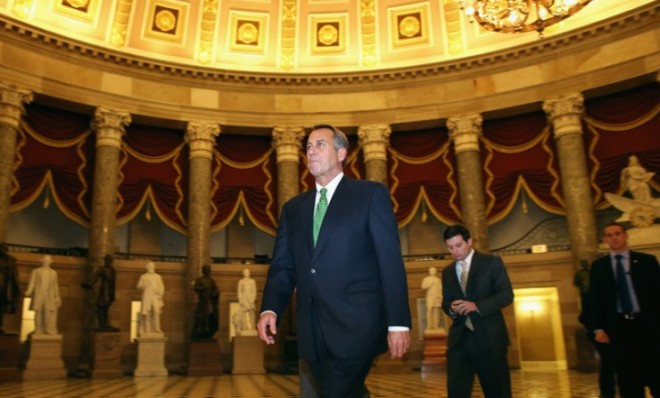After conservative revolt, the House clears fiscal-cliff deal
Despite a day of griping and intrigue among Republicans, the House sends President Obama a Senate deal to cancel a spate of fiscal discomfort


A free daily email with the biggest news stories of the day – and the best features from TheWeek.com
You are now subscribed
Your newsletter sign-up was successful
Late Tuesday, the House cleared a Senate compromise to cancel a host of tax increases and push off for two months some $110 billion in spending cuts, effectively pulling the country back from its 24-hour slow-motion slide over the side of the fiscal cliff. House Republicans allowed the bill to come up for a vote without any poison-pill spending-cut amendments — a strategy proposed by House Majority Leader Eric Cantor (R-Va.) and other conservatives in the House — and it needed a majority of Democrats to pass. In fact, only 85 of the 240 House Republicans joined 172 of the 191 Democrats in the chamber to approve the bill and send it to President Obama for his signature — the final vote, 257 to 167, was a far cry from the broadly bipartisan 89 to 8 vote in the Senate nearly 24 hours earlier.
This was the last act of the widely unpopular and unproductive 112th Congress, and it sets up plenty of drama for the 113th Congress after it gavels into session on Thursday. In the House, Speaker John Boehner (R-Ohio) faces an early test of his leadership when his caucus votes on whether to keep him in charge of the chamber or pass the gavel to another Republican, probably Cantor. Boehner and GOP budget wunderkind Rep. Paul Ryan (Wis.) voted in favor of the bill while Cantor, Majority Whip Kevin McCarthy (Calif.) and Chief Deputy Whip Peter Roskam (Ill.) all voted against it.
Whether or not he keeps his leadership position, "the speaker is undoubtedly weakened," says Daniel Newhauser at Roll Call. After losing most of his caucus in the vote — a violation of the "Hastert Rule," a 20-year-old tradition in which GOP speakers only call votes on bills that a majority of Republicans will support — "Boehner now slumps into the 113th Congress with gavel firmly in hand but with scant ability to wield its power to control his conference."
The Week
Escape your echo chamber. Get the facts behind the news, plus analysis from multiple perspectives.

Sign up for The Week's Free Newsletters
From our morning news briefing to a weekly Good News Newsletter, get the best of The Week delivered directly to your inbox.
From our morning news briefing to a weekly Good News Newsletter, get the best of The Week delivered directly to your inbox.
The speaker didn't end up playing his cards very well — he "rejected the White House's offers for a bigger deal that included big spending cuts and watched his 'plan B' die on the House floor," says Ezra Klein at The Washington Post. But once the Deomcratic-controlled Senate convincingly passed the bill, he had little choice but to bring that deal up for a floor vote and hope Democrats would carry it across the finish line. "Republicans realized they couldn't be blamed for pushing the country over the cliff." But the GOP now has a little more leverage for the next looming fiscal showdown, as the delayed spending cuts are a short two months away and Congress has to vote to raise the debt limit. So while Obama got most of what he wanted in this deal, "the question of who 'won' the fiscal cliff won't be answered till we know what happens when Congress reaches the debt ceiling."
A free daily email with the biggest news stories of the day – and the best features from TheWeek.com
Peter has worked as a news and culture writer and editor at The Week since the site's launch in 2008. He covers politics, world affairs, religion and cultural currents. His journalism career began as a copy editor at a financial newswire and has included editorial positions at The New York Times Magazine, Facts on File, and Oregon State University.
